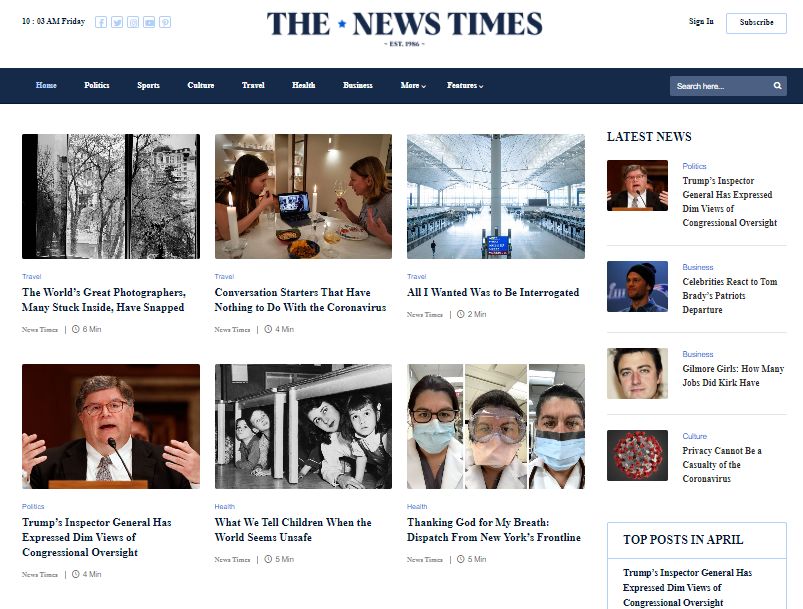The Essential Tips for Reading stnews.live for Maximum Insight
The Relevance of Fact-Checking in the Globe of News Online
The occurrence of misinformation in today's online news landscape has actually gotten to worrying degrees. Fact-checking organizations play a necessary role in combating this pattern. They validate claims and enhance the reliability of journalism. However, the effectiveness of these companies often rests on their methodologies and public assumption. As target markets browse this complicated atmosphere, the effects of their findings may shape the future of news consumption and count on. What does this mean for the stability of info progressing?

The Increase of Misinformation in the Digital Age
Exactly how has the introduction of electronic technology added to the spread of misinformation? The rapid development of the net and social networks platforms has assisted in the circulation of info at an unmatched pace. Individuals can share articles, videos, and point of views with a mere click, often without validating the web content's precision. Formulas focus on spectacular or psychologically billed material, bring about a spreading of misleading stories that catch attention.
In addition, the anonymity paid for by digital systems allows individuals to spread incorrect info without accountability (stnews.live). Misinformation prospers in echo chambers, where customers are subjected largely to perspectives that enhance their ideas, better setting frauds. The saturation of details can overwhelm individuals, making it testing to recognize qualified sources from undependable ones. Consequently, misinformation has come to be a pervasive issue in the electronic landscape, influencing popular opinion and rely on legitimate news resources
The Duty of Fact-Checking Organizations
Fact-checking organizations play an essential duty in boosting the trustworthiness of journalism by confirming insurance claims made in news records. Their efforts are crucial in combating false information, ensuring that exact information dominates in the digital landscape. By holding media outlets accountable, these companies add considerably to educated public discourse.
Enhancing Credibility in Journalism
While misinformation multiplies in the electronic age, fact-checking companies play a crucial role in improving the trustworthiness of journalism. These companies meticulously validate cases made in news articles, public declarations, and social media posts, making sure that info disseminated to the general public is exact and credible. By offering independent analyses, they act as an important resource for journalists, helping them keep high standards of stability. Additionally, their initiatives promote openness in media, promoting public depend on. As target markets end up being significantly critical, the existence of trustworthy fact-checking entities can distinguish reputable news sources from those that might spread falsehoods. Eventually, the commitment of fact-checking organizations to copyright truthfulness is vital for the health and wellness of democratic discussion.
Combating False Information Properly
As misinformation proceeds to spread rapidly throughout digital systems, the duty of fact-checking organizations comes to be progressively vital in the fight for accurate info. These organizations function as watchdogs, scrutinizing insurance claims made by public figures and media electrical outlets to assure liability. By using strenuous research study approaches and specialist analysis, they validate truths and make clear misleading narratives. Their searchings for are distributed via various networks, educating the general public and fostering vital reasoning. Additionally, collaborations with social networks systems enhance their reach, permitting for punctual flagging of false details. As digital literacy expands, the influence of fact-checking companies is necessary in equipping target markets to discern reality from falsehood, ultimately contributing to an extra enlightened culture.
Exactly How False Information Affects Public Assumption
Misinformation significantly threatens count on in media, leading audiences to question the reliability of news sources. Therefore, people frequently are attracted towards electrical outlets that strengthen their existing beliefs, adding to the polarization of opinions. This dynamic produces a fragmented information landscape, where shared understanding becomes significantly hard to achieve.
Count on Media

Rely on media has become significantly fragile in the digital age, where the rapid spread of incorrect info can skew public understanding. As misinformation multiplies throughout social media sites and online systems, target markets frequently discover it testing to discern legitimate sources from undependable ones. This uncertainty promotes uncertainty, leading lots of individuals to question the motives behind news coverage. Consequently, depend on in established media outlets has actually lessened, as consumers significantly transform to alternative sources that might lack extensive content standards. This erosion of depend on not just influences specific beliefs but also weakens the cumulative capability to involve in educated discussions. Eventually, the honesty of journalism is at stake, highlighting the crucial need for efficient fact-checking to recover confidence in the media landscape.

Polarization of Point of views
The increasing suspicion towards traditional media has actually added to a growing polarization of viewpoints among the general public. False information, typically distributed via social media and online platforms, plays a substantial function fit distinctive ideological splits. Individuals often choose information that lines up with their pre-existing ideas, reinforcing their perspectives while rejecting opposing point of views. This echo chamber result increases departments, leading to a fragmented public discourse where agreement comes to be increasingly evasive. Additionally, sensationalized narratives grow in this environment, additionally skewing public assumption and promoting question in legitimate resources. As polarization escalates, the necessity for reliable fact-checking ends up being vital to bridge spaces and promote educated discussions, ultimately guaranteeing a more cohesive society with the ability of steering intricate concerns.
Techniques for Effective Fact-Checking
Reliable fact-checking counts on a systematic strategy that includes comprehensive research study, confirmation of resources, and essential analysis of cases. A foundational strategy is cross-referencing details from several qualified sources to verify its precision. Fact-checkers usually make use of specialized data sources and archives to trace the origin of specific statements, making sure that the reported information lines up with documented evidence.
Another important technique involves scrutinizing the context in which cases exist. Misleading information can emerge from out-of-context quotations or careful information use. By analyzing the more comprehensive narrative, fact-checkers can determine possible prejudices or misconceptions.
Additionally, involving with experts in appropriate areas can give clearness and understanding official site that improves the fact-checking process. This partnership can discover nuances that laypeople might neglect - stnews.live. Ultimately, a self-displined strategy incorporating these strategies fosters an extra informed public, enhancing the reliability of information disseminated in the digital age
The Impact of Social Media Site on News Usage
Exactly how has social networks transformed the method people eat news? The introduction of platforms like Facebook, Twitter, and Instagram has significantly modified news usage patterns. News is currently disseminated rapidly, allowing users to access real-time updates and involve with web content with likes, shares, and comments. This immediacy has actually fostered a choice for bite-sized information, usually at the expenditure of extensive evaluation.
Social media makes it possible for customized news feeds, where formulas curate web content based on customer preferences, producing resemble chambers that may restrict exposure to diverse viewpoints. The role of standard news electrical outlets has actually decreased as people significantly depend on peer referrals and trending topics. Subsequently, the reliability of information is commonly endangered, as sensationalism can outweigh factual coverage. Overall, social media has improved news usage, highlighting rate and customization while challenging the standards of journalistic integrity.
Equipping Audiences to Identify Dependable Sources

In addition, analyzing the authorship and organizational background of news posts can expose potential prejudices. Cross-referencing information throughout multiple reputable electrical outlets better improves the verification process. Making use of digital tools, such as web browser expansions that rate the credibility of internet sites, can additionally help in determining reliable information. By actively engaging with these resources and cultivating a critical frame of mind, target markets can much better outfit themselves to recognize trusted news sources, ultimately fostering a much more informed society in the middle of the complexities of today's media setting.
The Future of Journalism and Fact-Checking
As the media landscape progresses, the future of journalism and fact-checking faces both challenges and opportunities. The rise of electronic platforms has democratized details circulation, permitting diverse voices to emerge. Nevertheless, this has actually additionally caused the proliferation of misinformation, necessitating robust fact-checking systems. Journalists will increasingly rely on technology, consisting of AI tools, to verify realities rapidly and efficiently.
Collaboration in between wire service and fact-checking entities is prepared for to enhance integrity and transparency. In addition, target market interaction will certainly play an important function, as educated visitors come to be substantial companions in determining trustworthy content.
The demand for liability and accuracy is likely to grow, pressing reporters to useful content promote high standards in their coverage. Inevitably, the future of journalism may rest on its capacity to adjust to technical advancements while preserving journalistic integrity, making certain that fact-checking stays a keystone of reputable news.
Frequently Asked Concerns
Exactly How Can I Report False Information I Encounter Online?
To report false information encountered online, individuals can make use of platform-specific reporting devices, give clear evidence, and share the info with fact-checking organizations. Engaging with area conversations can additionally help elevate understanding about the false information.
What Prevail Indicators of Misinformation in News Articles?
Typical indicators of false information in news write-ups include astonishing headings, absence of credible resources, psychological language, irregular facts, and absence of author qualifications. Readers must critically evaluate material for these indicators to discern accuracy.
Exactly How Do Fact-Checkers Verify Sources?
Fact-checkers confirm sources by cross-referencing details with trustworthy databases, seeking advice from professionals, and analyzing the initial context of cases. They also assess the reliability of the resources, making sure accurate and reliable details for public intake.
What Lawsuits Can Be Taken Versus False information?
Lawful actions against false information might consist of vilification claims, cease-and-desist orders, and regulative penalties. Targets can prosecute via civil courts, while some territories enforce fines or permissions on systems sharing false info.
Are There Apps for Fact-Checking News On-The-Go?
Countless applications exist for fact-checking news on-the-go, consisting of Snopes, FactCheck.org, and PolitiFact. These applications help users confirm claims swiftly, promoting informed decision-making and promoting a more discerning method to consuming news in real-time.